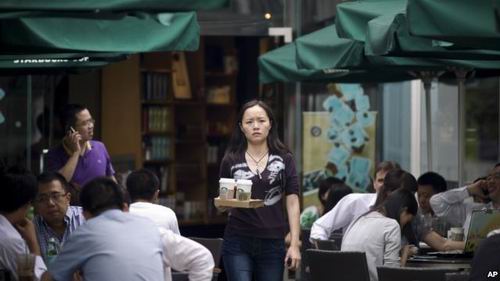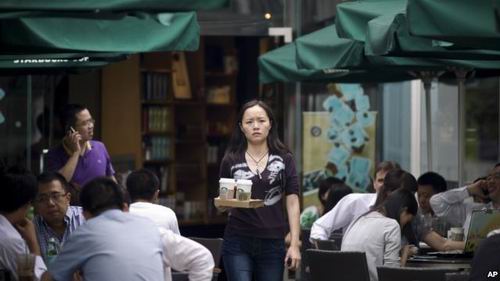VOA慢速英语: 相对茶来说,中国人更喜欢咖啡?
- 参考译文
- 听力原文
Will Chinese Drink Coffee over Tea?
 |
|
A woman orders cups of coffee at a Starbucks cafe in Beijing, China. (June 2011.) |
相比茶来说,中国人更愿意喝咖啡
Asiahas long tradition of tea-drinking. And China is no exception.
亚洲饮茶的历史悠久,中国也不例外。
However, lately more and more Chinese people are turning to a different drink. Coffee has become an increasingly popular choice of Chinese people living abroad and in the country’s huge cities. It is also a popular crop among those living in the mountains of southern Yunnan Province.
但是,近来,越累越多的中国人开始转向另一种饮料。咖啡日渐成为无论在国外还是国内大城市里中国人的选择。咖啡是云南省南部山区普遍种植的作物。
In big cities such as Beijing, coffee shops seem to be on nearly every major street corner. These shops are not just selling drinks from Starbucks, the world-famous coffee company. Coffee businesses from South Korea, Taiwan, Hong Kong and Britain are also operating in China.
一些大城市例如:北京,几乎每条主要的街角都会有咖啡店。这些咖啡店不仅仅销售世界著名咖啡公司——星巴克生产的咖啡。中国还有来自韩国、台湾、香港和英国的咖啡生意。
I spoke with some Chinese women to learn if they like coffee over tea since moving to the United States.
我与一些搬到美国住的中国女性进行谈话,她们是否喜欢咖啡多于喜欢茶。
Coffee or tea? Which is your favorite drink?
咖啡或者茶?哪种你最喜欢?
Tea-drinking is steeped in the culture and traditions of many Asian countries, like China and Japan. But is that changing? Are young people from Asia now choosing a cup of coffee instead of tea?
饮茶文化是亚洲很多国家文化和传统的一部分。但是这种文化是否在变化?来自亚洲的年轻人是否选择咖啡而不是茶?
BeiBei Su is from China. She has been living in the United States for the past eight years. Before that, she lived in Italy for two years. We spoke to her at a crowded Vietnamese noodle restaurant near Washington, D.C. Ms. Su says she likes tea better than coffee. But she adds that may not be true among the younger generation in China.
来自中国的苏北北,已经在美国待了八年多。来美国之前,她在意大利住了两年。在华盛顿特区附近的一家拥挤的越南面馆,我们跟她进行交谈。苏女士说:相比咖啡,她更喜欢茶。但她说对中国更年轻的一代来说,恐怕就不是这样了。
Anna: “Are you a coffee drinker or tea drinker. “
安娜:“你喜欢喝咖啡还是喜欢喝茶?”
BeiBei Su: “I’m a tea drinker.
苏北北:“我喜欢喝茶。”
Anna: “Do you think Chinese people are drinking more coffee and becoming coffee drinkers?”
安娜:“你认为中国人会不会因为喝更多的咖啡,而成为喝咖啡的人群呢?”
BeiBei Su: “I think they are definitely becoming coffee drinkers … for the younger generation they love coffee.”
苏北北:“我认为他们肯定会成为喝咖啡的人群…因为年轻人更喜欢咖啡。”
Many young Chinese people drink coffee socially -- when meeting with friends. Yang Lin lives in the U.S. but comes from an area in China famous for growing tea. She used to only drink tea while in China. But now, she says, she drinks both and for different reasons.
许多年轻人社交——会见朋友时都会喝咖啡。杨林住在美国,但是她来自中国盛产茶叶的地方。在中国的时候,她只喝茶。但是现在因为各种原因,她既喝茶又喝咖啡。
“I would say ... I was definitely a tea drinker when I was back in China. But now, you know, with the Starbucks influence, and all the different flavors and holiday drinks … I think I like coffee and tea equally now.”
“我想说…当我回到中国,我就会变成喝茶那一类人群。但是,现在由于星巴克的影响,各种不同口味的咖啡和假日饮品的出现…我认为现在对于咖啡和喝茶,我两样都喜欢。”
Yang Lin says that drinking coffee for her is a social event. She and her co-workers like to sit in a café and talk over a cup of coffee.
杨林说喝咖啡是一种社交活动。她和同事会坐在咖啡馆,谈谈天,喝喝咖啡。
Tea, she says, is more about family memories. She grew up in Fujian province -- an area known for its tea. Ms. Yang says that as a child, her family would gather together in the evening and talk about the day’s events over a steaming pot of tea. So now, even the smell of Fujian tea brings back these warm family memories.
她说:喝茶更多的是关于家庭的记忆。她在福建省长大,福建盛产茶叶。杨女士说她小时候,晚上,全家人会坐在一起,喝着茶谈论当天发生的事。因此,现在福建的茶香把人带回到温暖的家庭记忆中去。
Voyo is another Chinese woman who now lives in Washington, D.C. She says that after moving to the U.S. her tastes changed. We would call her a coffee convert,someone who now chooses to drink coffee.
Voyo是另一位住在华盛顿特区的中国女性。她说自从来到美国,她的品味就改变了。我们称之为咖啡转变——现在选择和咖啡。
“I used to be a tea drinker before I came to the United States. But now I am a coffee drinker and actually getting to be a very heavy coffee drinker. Like I go (went) from one cup a day to three cups a day and if I stop one day I will have(a) headache.”
“来美国之前,我经常喝茶;但是现在我喜欢和咖啡,而且变成一个非常喜欢咖啡的人。刚开始我只喝一杯咖啡,后来喝三杯咖啡,假如哪一天停止喝咖啡我会头疼的。”
On average a person in China drinks about five cups of coffee a year. This information comes from the China Coffee Association Beijing.
中国人平均一年喝五杯咖啡。这个结果来自北京咖啡协会的统计数据。
That amount is far below the world average of 240 cups a year. But the association says the amount of coffee that Chinese drink is growing by about15 percent every year.
这一数量远低于世界一年平均240杯的数量。但是咖啡协会称中国人喝咖啡的数量每年增长15%。
Coffee in tealand
茶叶生产国里的咖啡
On any given day, Groove Café - a South Korean coffee chain - is busy with activity and coffee drinkers in Beijing. A chain is a group of stores or businesses that are usually under the same ownership.
一家韩国Groove Café咖啡连锁店正忙于北京的活动。连锁店是同一品牌领导下经营的商店或生意。
With more people drinking coffee, many see an economic opportunity for Chinese-grown beans. China-grown coffee could be a money-maker even if most of the coffee on sale in China is imported.
随着越来越多的人喝咖啡,很多人看到在中国种植咖啡豆的商机。尽管在中国销售的咖啡都是进口的,但是在中国种植咖啡仍然会赚钱。
Most of China’s coffee is grown in the southern province of Yunnan. A French missionary brought plants to the area over a century ago. But the roots of growing coffee did not take hold until more recently.
中国大部分的咖啡在云南省的南部种植。100多年前,一位法国传教士将咖啡作物带到这一地区。但是直到最近才开始种植咖啡。
I’m Anna Matteo.
我是安娜·马特奥。
What about you? Are you a coffee drinker or tea drinker? Or both? Tell us about the coffee culture or tea culture where you’re from in the comments section.
你呢?你是喝咖啡还是喝茶?或者两种都喝?在评论部分告诉我们你所在地方的咖啡文化或者茶文化。
_____________________________________________________________
Words in This Story
steep – v. to soak in a liquid at a temperature under the boiling point as you do with tea; also means to cover a subject thoroughly. Often used with “tradition” or “culture” as in “steeped in tradition” or “steeped in culture.”
convert – v. to change from one form or use to another; n. a person who has changed to a different religion, belief, political party, etc.
missionary – n. a person who is sent to a foreign country to do religious work(such as to convince people to join a religion or to help people who are sick,poor, etc.)
Will Chinese Drink Coffee over Tea?
 |
|
A woman orders cups of coffee at a Starbucks cafe in Beijing, China. (June 2011.) |
Asia has long tradition of tea-drinking. And China is no exception.
However, lately more and more Chinese people are turning to a different drink. Coffee has become an increasingly popular choice of Chinese people living abroad and in the country’s huge cities. It is also a popular crop among those living in the mountains of southern Yunnan Province.
In big cities such as Beijing, coffee shops seem to be on nearly every major street corner. These shops are not just selling drinks from Starbucks, the world-famous coffee company. Coffee businesses from South Korea, Taiwan, Hong Kong and Britain are also operating in China.
I spoke with some Chinese women to learn if they like coffee over tea since moving to the United States.
Coffee or tea? Which is your favorite drink?
Tea-drinking is steeped in the culture and traditions of many Asian countries, like China and Japan. But is that changing? Are young people from Asia now choosing a cup of coffee instead of tea?
BeiBei Su is from China. She has been living in the United States for the past eight years. Before that, she lived in Italy for two years. We spoke to her at a crowded Vietnamese noodle restaurant near Washington, D.C. Ms. Su says she likes tea better than coffee. But she adds that may not be true among the younger generation in China.
Anna: “Are you a coffee drinker or tea drinker. “
BeiBei Su: “I’m a tea drinker.
Anna: “Do you think Chinese people are drinking more coffee and becoming coffee drinkers?”
BeiBei Su: “I think they are definitely becoming coffee drinkers … for the younger generation they love coffee.”
Many young Chinese people drink coffee socially -- when meeting with friends. Yang Lin lives in the U.S. but comes from an area in China famous for growing tea. She used to only drink tea while in China. But now, she says, she drinks both and for different reasons.
“I would say ... I was definitely a tea drinker when I was back in China. But now, you know, with the Starbucks influence, and all the different flavors and holiday drinks … I think I like coffee and tea equally now.”
Yang Lin says that drinking coffee for her is a social event. She and her co-workers like to sit in a café and talk over a cup of coffee.
Tea, she says, is more about family memories. She grew up in Fujian province -- an area known for its tea. Ms. Yang says that as a child, her family would gather together in the evening and talk about the day’s events over a steaming pot of tea. So now, even the smell of Fujian tea brings back these warm family memories.
Voyo is another Chinese woman who now lives in Washington, D.C. She says that after moving to the U.S. her tastes changed. We would call her a coffee convert, someone who now chooses to drink coffee.
“I used to be a tea drinker before I came to the United States. But now I am a coffee drinker and actually getting to be a very heavy coffee drinker. Like I go (went) from one cup a day to three cups a day and if I stop one day I will have(a) headache.”
On average a person in China drinks about five cups of coffee a year. This information comes from the China Coffee Association Beijing.
That amount is far below the world average of 240 cups a year. But the association says the amount of coffee that Chinese drink is growing by about15 percent every year.
Coffee in tealand
On any given day, Groove Café - a South Korean coffee chain - is busy with activity and coffee drinkers in Beijing. A chain is a group of stores or businesses that are usually under the same ownership.
With more people drinking coffee, many see an economic opportunity for Chinese-grown beans. China-grown coffee could be a money-maker even if most of the coffee on sale in China is imported.
Most of China’s coffee is grown in the southern province of Yunnan. A French missionary brought plants to the area over a century ago. But the roots of growing coffee did not take hold until more recently.
I’m Anna Matteo.
What about you? Are you a coffee drinker or tea drinker? Or both? Tell us about the coffee culture or tea culture where you’re from in the comments section.
_____________________________________________________________
Words in This Story
steep – v. to soak in a liquid at a temperature under the boiling point as you do with tea; also means to cover a subject thoroughly. Often used with “tradition” or “culture” as in “steeped in tradition” or “steeped in culture.”
convert – v. to change from one form or use to another; n. a person who has changed to a different religion, belief, political party, etc.
missionary – n. a person who is sent to a foreign country to do religious work(such as to convince people to join a religion or to help people who are sick,poor, etc.)
- 频道推荐
- |
- 全站推荐
- 推荐下载
- 网站推荐




















